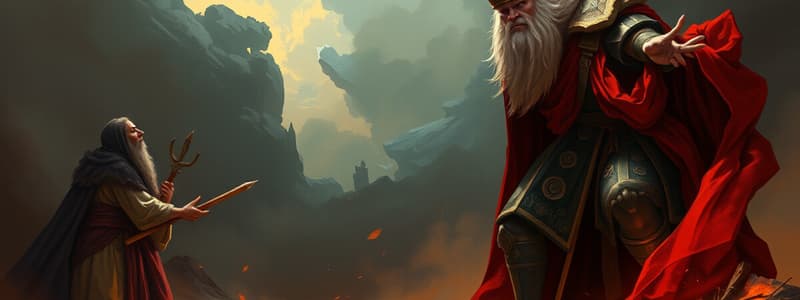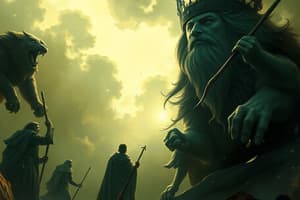Podcast
Questions and Answers
What is King Lear's primary mistake in Act 1, scene 1?
What is King Lear's primary mistake in Act 1, scene 1?
- Underestimating his daughters' intelligence
- Refusing to abdicate the throne
- Ignoring the advice of his loyal subjects
- Choosing to split his kingdom (correct)
What does King Lear hope to achieve with the love-test he sets for his daughters?
What does King Lear hope to achieve with the love-test he sets for his daughters?
- To assess their loyalty to the kingdom
- To prepare them for leadership roles
- To determine which daughter deserves the throne
- To reinforce his self-image (correct)
How does Cordelia's response to Lear's love-test differ from that of her sisters?
How does Cordelia's response to Lear's love-test differ from that of her sisters?
- She shows indifference toward her father's request
- She declares her love in grand terms
- She refuses to participate in the competition (correct)
- She exaggerates her feelings profoundly
Which characteristic best describes King Lear's behavior at the beginning of the play?
Which characteristic best describes King Lear's behavior at the beginning of the play?
What event signals Lear's reversal of fortunes?
What event signals Lear's reversal of fortunes?
What realisation does Lear come to about his state in Act 3, scene 2?
What realisation does Lear come to about his state in Act 3, scene 2?
Which of the following statements reflects Lear's transformation during the storm?
Which of the following statements reflects Lear's transformation during the storm?
What critical lesson does Lear express in Act 3, scene 4?
What critical lesson does Lear express in Act 3, scene 4?
What does Lear mean when he says, 'through tattered clothes great vices do appear'?
What does Lear mean when he says, 'through tattered clothes great vices do appear'?
What does Edgar's remark 'there is reason in madness' suggest about Lear's journey?
What does Edgar's remark 'there is reason in madness' suggest about Lear's journey?
What does Lear imagine for his future with Cordelia when they are in prison?
What does Lear imagine for his future with Cordelia when they are in prison?
How does Lear react upon realising Cordelia has died?
How does Lear react upon realising Cordelia has died?
What does Cordelia symbolise in Lear's life?
What does Cordelia symbolise in Lear's life?
In what way does Lear's character evolve throughout the play?
In what way does Lear's character evolve throughout the play?
Flashcards
King Lear's Fatal Error
King Lear's Fatal Error
Dividing his kingdom for a carefree existence, disrupting the natural order.
Lear's Love Test
Lear's Love Test
Lear attempts to measure daughterly love by demanding praise.
Lear's Hubris
Lear's Hubris
Excessive pride and arrogance.
Cordelia's Honesty
Cordelia's Honesty
Signup and view all the flashcards
Lear's Rage
Lear's Rage
Signup and view all the flashcards
Lear's Banishment
Lear's Banishment
Signup and view all the flashcards
Anagnorisis
Anagnorisis
Signup and view all the flashcards
Lear's Storm
Lear's Storm
Signup and view all the flashcards
Lear's Madness
Lear's Madness
Signup and view all the flashcards
Lear's Self-Awareness
Lear's Self-Awareness
Signup and view all the flashcards
Lear's Reconciliation
Lear's Reconciliation
Signup and view all the flashcards
Tragic End
Tragic End
Signup and view all the flashcards
Goneril and Regan's Deceit
Goneril and Regan's Deceit
Signup and view all the flashcards
The Fool
The Fool
Signup and view all the flashcards
Gloucester's Wisdom
Gloucester's Wisdom
Signup and view all the flashcards
Lear's Mock Trial
Lear's Mock Trial
Signup and view all the flashcards
Lear's Empathy
Lear's Empathy
Signup and view all the flashcards
Theme of Fate
Theme of Fate
Signup and view all the flashcards
Love and Loss
Love and Loss
Signup and view all the flashcards
Lear's Regret
Lear's Regret
Signup and view all the flashcards
Study Notes
King Lear: Tragic Heroism and Themes
- King Lear opens amidst grandeur, showcasing his commanding authority over subjects.
- His fatal error is the division of his kingdom, seeking to relinquish power for a carefree existence, which disrupts the natural order.
- Lear believes he can control his legacy through a love-test for his daughters, revealing his hubris and self-obsession.
- Goneril and Regan's deceitful praises illustrate Lear's blindness to their true natures, while Cordelia's honest response reflects true love.
- Lear’s rage leads him to disown Cordelia and banish Kent, further blinding him to the wisdom around him.
- The banishment of Cordelia and Kent precipitates Lear’s downfall, leading to his eventual madness.
- Goneril and Regan's discussion highlights Lear's impending peripeteia, marking a shift in his fortunes.
- Lear's abusive curse against Goneril foreshadows his unraveling as he steps into the storm, both literally and metaphorically.
- The storm symbolises his inner turmoil as he grapples with madness, realizing the grim state of humanity.
Anagnorisis and Self-Realization
- Lear experiences anagnorisis in the storm, acknowledging his vulnerabilities: "a poor, infirm, weak and despised old man."
- He begins to show empathy for the Fool, signifying a shift from egotism to concern for others.
- Despite his madness, Lear recognises the effects of his own blindness: "I am a man more sinned against than sinning."
- Lear’s encounter with Gloucester accentuates the theme that wisdom can be gained from suffering and insight about society's superficiality.
- While deluded, Lear proposes a mock trial for his daughters, indicating a lack of complete understanding but a desire for accountability.
Transformation and Tragedy
- By Act 4, Lear demonstrates newfound self-awareness, especially in his admission of being old and foolish.
- His reconciliation with Cordelia admits his past wrongs, seeking her forgiveness, highlighting their bond.
- Lear’s longing for a simple, joyful future with Cordelia contrasts sharply with the tragedy of their separation.
- Ultimately, despite gaining insight and empathy, Lear meets a tragic end characterized by loss and despair.
- The brutal conclusion sees Lear carrying Cordelia’s body, culminating in his profound grief: “howl, howl, howl!”
- Lear dies believing in Cordelia’s potential survival, which elevates his tragic trajectory, marking a culmination of his emotional suffering and enlightenment.
- His journey from pride to despair exemplifies the themes of regret, love, and the harsh realities of fate in Shakespearean tragedy.
Studying That Suits You
Use AI to generate personalized quizzes and flashcards to suit your learning preferences.




